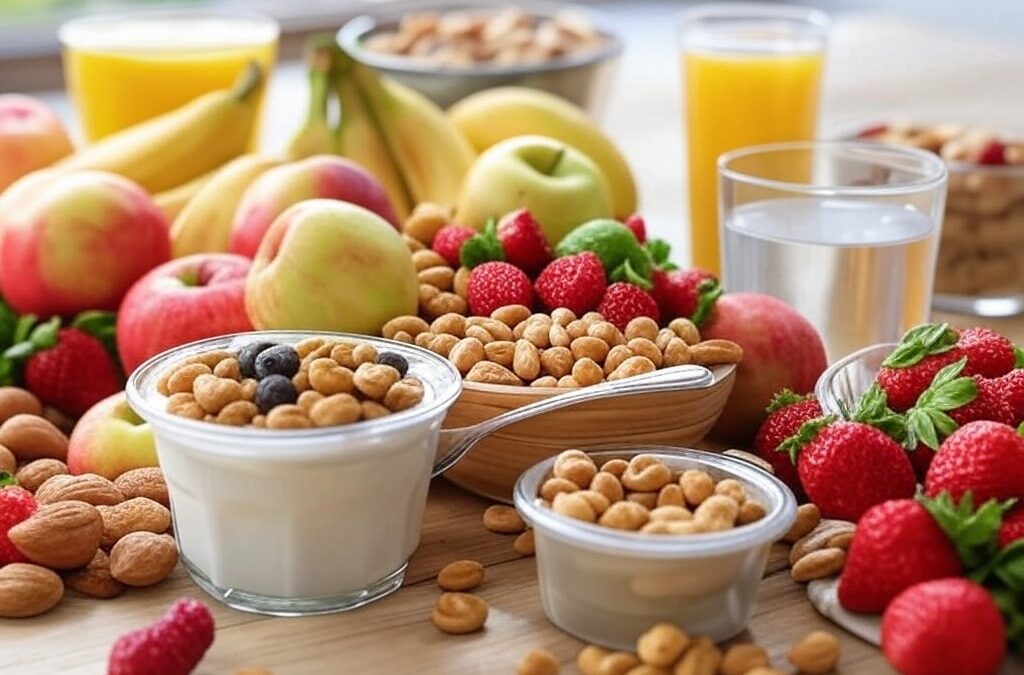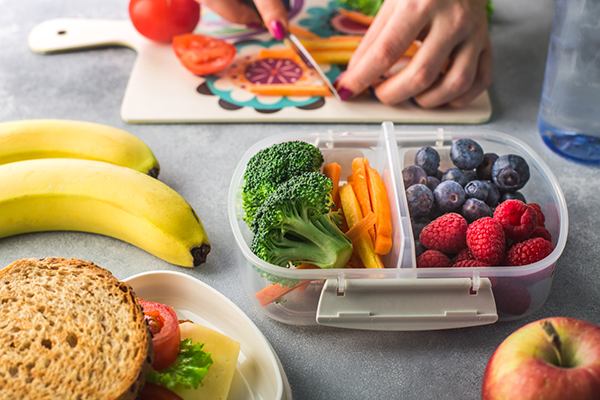
by TutorUp | Mar 18, 2024 | Parents and Home
As a parent, you’ve probably noticed how your child’s energy and focus can shift from day to day. Maybe they’re sharp and engaged one morning, then sluggish and distracted the next. What they’re eating could be playing a bigger role in that than you might think. Nutrition isn’t just about keeping them full—it directly impacts how well their brain functions, which in turn affects their learning. For school-age kids, whose minds are still developing, what’s on their plate can either fuel their success or quietly hold them back. Let’s unpack this a bit and talk about how you can set them up to thrive with some simple food choices.
How the brain is impacted
The brain is an energy-hungry organ, and it relies on a steady supply of nutrients to keep things like memory, attention, and problem-solving in gear. Research backs this up—studies show that kids with balanced diets perform better on tests and have stronger concentration than those who don’t. Take breakfast, for example. After a night of fasting, their brains need a recharge. Something like oatmeal with berries or scrambled eggs with whole-grain toast can give them slow-burning carbs and protein to sustain energy through those morning classes. Skip that—or worse, send them off with a sugary pastry—and their blood sugar spikes and crashes, leaving them foggy by mid-morning. It’s not just about filling their stomachs; it’s about giving their brains what they need to tackle math problems or follow a story in English.
What about snacks?
On the flip side, some foods can work against them. Processed snacks heavy in sugar or saturated fats—like chips, candy, or fast food—might taste good but can dull their mental edge. Studies link diets high in these to slower cognitive processing and even mood swings, which can make a tough school day feel even harder. It’s not that they can’t ever have a treat, but leaning too much on these can sap their focus over time. Instead, think about swapping in options that support their learning. Nuts or yogurt make great snacks—rich in healthy fats and protein to keep them steady without the sugar rollercoaster. Even something as simple as sliced apples with peanut butter can do the trick.
Focus on drinks
Hydration matters just as much. A dehydrated brain is a sluggish one, and kids often don’t realize they’re thirsty until it’s affecting them. Research shows even mild dehydration can impair attention and memory—two things they can’t afford to lose when they’re trying to grasp new concepts. Water’s the best bet here, plain and simple. Sugary drinks like soda or juice might seem refreshing, but they pile on empty calories and can lead to that same energy crash. Keeping a water bottle handy, maybe with a splash of lemon if they’re picky, can make a real difference in how alert they stay.
A balanced dinner
Dinner’s another chance to set them up for success. After a long day, their brains are still processing what they’ve learned, and sleep is when a lot of that locks in. Foods rich in omega-3s—like salmon or chia seeds—support memory and cognitive growth, while complex carbs like sweet potatoes or quinoa give them steady energy to wind down without a sugar jolt. Try to steer clear of heavy, greasy meals late at night; they can mess with sleep quality, leaving your child groggy for the next day’s lessons. A balanced plate doesn’t have to be fancy—just intentional.
Don’t try to change everything at once
You don’t need to overhaul everything overnight. Start small—maybe trade the morning Pop-Tart for a smoothie with spinach, banana, and a scoop of almond butter. Toss some veggies into their lunch or keep a stash of trail mix for after school. The goal isn’t perfection; it’s consistency. When their brain’s getting the right fuel—lean proteins, whole grains, fruits, veggies, and plenty of water—they’re better equipped to learn, retain, and grow. And as a parent, knowing you’re helping their mind stay sharp might just ease some of that daily worry about how they’re doing in school.

by TutorUp | Mar 16, 2023 | Parents and Home
Or, you are what you eat
We already know that eating healthy is good for growth and development, but did you know that it’s also associated with higher academic achievement?
Studies on children and adolescents (ages 5-18) have long focused on breakfast consumption and how it affects academic achievement. These studies have shown a positive association when children eat more fruit, vegetables, and micronutrients including folate and iron. Lowering the consumption of junk foods has also been associated with higher academic achievement.
Similar studies have not typically focused on college-age students. According to the National Center for Biotechnology Information however, seven recent studies reviewed the impact of diet on college student performance in school. While a number of factors and health behaviors can have an effect on academic achievement, college students’ eating habits have received much less attention than factors like sleep deprivation, poor mental health status, and alcohol use. Not surprisingly, the studies found that consuming a regular breakfast, eating 2-3 meals per day, and consuming more servings of fruit had a positive correlation between GPA and dietary intake/behavior.
Eating Habits of Students with Higher Grades
In 2019, the CDC published the results of a national Youth Risk Behavior Survey which showed that students with higher academic grades were more likely to engage in healthy dietary behaviors than students with lower grades. While this does not prove causation, these associations still have significance.
They found that students with higher grades were more likely to eat breakfast on all 7 days of the week; eat fruit or drink 100% fruit juice one or more times per day; eat vegetables one or more times per day; and were not drinking soda or pop. Interestingly, there was not an association between drinking milk and academic grades.
Can Some Eating Habits Actually Hinder Learning?
According to Neuroscience News, consuming refined sugars and saturated fats can have detrimental effects on the brain. “High-fat and processed-food diets are also associated with lower cognitive function and memory in humans and animal models as well as a higher incidence of neurodegenerative diseases. However, researchers still don’t know if these effects are due to these foods or to the weight gain and insulin resistance that develop with long-term consumption of these diets.”
Early Nutrition Shapes the Brain
Stony Brook University researchers conducted a study that showed there is a strong relationship between what we eat early in life, as babies or young children, and what our food preferences will be as adults. The study also found that what we eat early in life suggests a link between taste and brain function in health and disease. Arianna Maffei, PhD, Senior Author and Professor in the Department of Neurobiology and Behavior at Stony Brook University explained, “Expanding our knowledge of the developmental neural circuits for tastes – as studies like this do – will contribute to our understanding of food choices, eating disorders, and diseases associated with brain disorders.”
There’s a Link Between Food, Mood, and Learning
An Australian study found that young people with the unhealthiest diets were nearly 80% more likely to suffer from depression. These children also exhibited more emotional and behavioral problems than children with healthy eating habits. Research from the National Institutes of Health and from the British Journal of Nutrition showed that what children eat can improve mental health, enhance cognitive skills like concentration and memory, and improve academic performance.
Accessing Healthy Food – The Economic Link
Nutrition is key to brain development, however access to healthy food can be a challenge to those with lower incomes. Diets high in vegetables and healthy proteins cost more than diets rich in processed foods and refined grains. This cost disparity has been increasing since the mid 2000s.
In addition, many people in the United States have limited access to supermarkets and other sources of more healthy foods. These areas are often called “food deserts” and can cause families to turn to fast food or convenience store items.
This lack of nutrition can lead to stunted mental and physical development in young children. Children with diets lacking in fresh fruits, vegetables, and healthy proteins tend to have lower test scores and can also end up missing school or having to repeat grades.
Organizations like Health Start Foundation and Action for Healthy Kids provide helpful guidance on eating healthy on a budget, and Healthline has published a list of 28 Healthy Foods That Are Incredibly Cheap.



